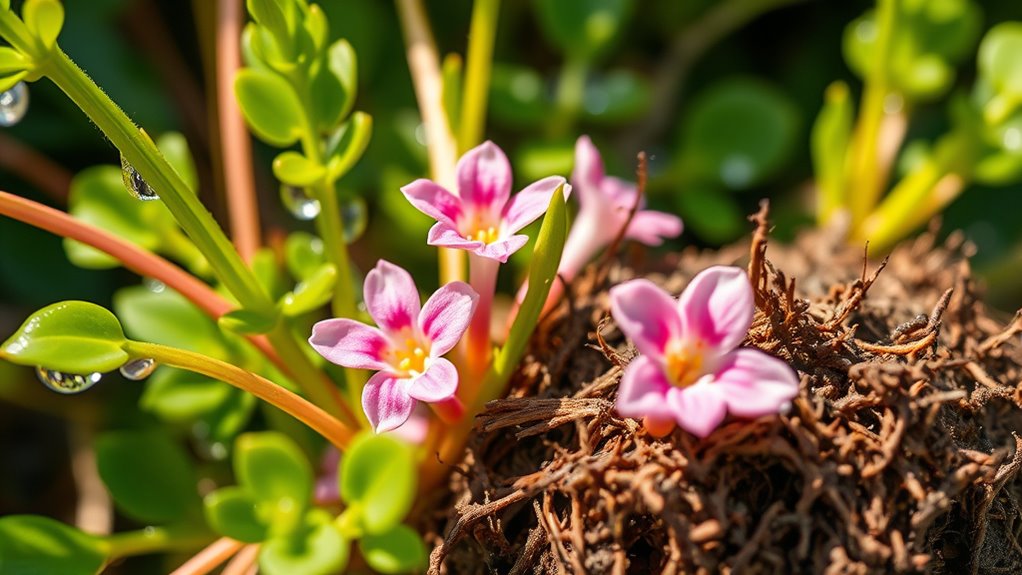Rhodiola Rosea is a natural adaptogen that helps you combat mental and physical fatigue by supporting your resilience and energy levels. It balances neurotransmitters like serotonin and dopamine, enhancing focus, mood, and mental clarity. It also improves endurance, reducing muscle fatigue and boosting stamina during demanding activities. By supporting stress management and recovery, Rhodiola helps you stay resilient in tough times. To discover how to incorporate it safely into your routine, keep exploring further.
Key Takeaways
- Rhodiola Rosea is an adaptogen that helps combat mental and physical fatigue by supporting stress resilience and energy levels.
- It enhances mental clarity, focus, and mood stability through regulation of neurotransmitters like serotonin and dopamine.
- Rhodiola reduces cortisol and oxidative stress, aiding recovery and improving endurance during intense physical activity.
- Typical dosages range from 200-400 mg daily, taken consistently to maximize adaptogenic benefits.
- It is generally safe but should be used cautiously, especially during pregnancy, nursing, or with medications, under professional guidance.
The History and Traditional Uses of Rhodiola Rosea

Rhodiola Rosea has been valued for centuries as a natural remedy in traditional medicine, especially in regions like Siberia, Scandinavia, and Russia. In ancient Siberian herbal medicine, locals used the plant to boost energy, endurance, and resilience against harsh climates. They believed it helped improve physical strength and reduce fatigue during long, demanding winters. The plant’s adaptogenic properties made it a staple in their herbal medicine practices, providing a natural way to enhance vitality. Additionally, its role as an adaptogen has contributed to its enduring reputation for supporting overall health. Modern research continues to explore its adaptogenic effects and potential health benefits. Today, its historical significance continues to influence modern herbal medicine, emphasizing its longstanding reputation as a powerful adaptogen for physical and mental well-being. The tradition of using Rhodiola Rosea underscores its importance as a natural energizer and resilience booster for those facing physical and mental stress. Its ability to support mental and physical fatigue makes it especially relevant in today’s fast-paced world, where stress management and vitality are highly valued.
How Rhodiola Rosea Supports Mental Clarity and Focus

Rhodiola Rosea can help improve your mental clarity and focus by balancing your neurotransmitters, making it easier to stay alert. It also reduces mental fatigue, so you can maintain concentration longer. With these effects, Rhodiola supports your cognitive performance throughout the day. Additionally, by promoting spiritual awakening and enlightenment, Rhodiola may help foster a clearer mindset that aligns with your personal growth and well-being. Engaging in mindfulness practices alongside Rhodiola can further enhance mental resilience and emotional stability. Incorporating holistic health approaches can maximize the benefits of Rhodiola for overall mental clarity, especially as continuous training and professional development improve cognitive adaptability.
Enhances Neurotransmitter Balance
Because it influences key brain chemicals, Rhodiola Rosea helps balance neurotransmitters like serotonin, dopamine, and norepinephrine. This neurotransmitter regulation supports your mental clarity and sharpness, enabling you to stay focused and alert throughout the day. By promoting mood stabilization, Rhodiola reduces the fluctuations that can impair concentration and decision-making. When your neurotransmitter levels are balanced, you experience fewer mood swings and heightened emotional resilience. This adaptogenic herb naturally supports your brain’s chemistry, helping you maintain a calm yet alert state. As a result, your ability to think clearly improves, and mental fatigue diminishes. Additionally, supporting neurotransmitter balance is essential for maintaining overall cognitive function and emotional well-being. With consistent use, Rhodiola Rosea enhances overall cognitive function by ensuring your neurotransmitter balance remains steady, empowering you to perform at your best. Moreover, it can help reduce stress-related fatigue and improve your capacity to handle daily challenges effectively.
Reduces Mental Fatigue
By helping to balance your brain’s neurotransmitters, Rhodiola Rosea also plays a key role in reducing mental fatigue. This adaptogen provides an energy boost, allowing you to stay alert and focused during demanding tasks. It supports stress reduction by minimizing cortisol levels, which helps prevent burnout and mental exhaustion. As your mental clarity improves, you’ll find it easier to concentrate and make decisions without feeling overwhelmed. Rhodiola’s natural properties help sustain your mental stamina, so fatigue doesn’t set in as quickly. Additionally, research on brainwave patterns suggests that Rhodiola can influence neural activity to promote a calmer yet alert mental state. Its ability to enhance cognitive function makes it a valuable supplement for maintaining mental performance in high-pressure situations. Incorporating Rhodiola into your routine may also support adrenal health, which is vital for managing stress effectively. This adaptogen’s ability to promote stress resilience can further enhance your overall well-being. Whether you’re facing long work hours or mental challenges, incorporating Rhodiola can enhance your resilience, keeping you sharp and energized throughout the day. It’s a natural way to fight fatigue and maintain mental performance. Supporting mental stamina is an essential aspect of overall well-being, especially when managing stress and fatigue.
The Role of Rhodiola in Boosting Physical Endurance

When it comes to enhancing physical endurance, Rhodiola rosea has gained recognition for its adaptogenic properties that help the body manage stress and fatigue. By supporting your energy levels, it can improve athletic performance during intense workouts or prolonged activity. Rhodiola may also aid muscle recovery by reducing oxidative stress and inflammation, helping you bounce back faster after exertion. Its ability to boost stamina means you can push harder and longer, making it a valuable supplement for athletes and active individuals. Incorporating Rhodiola into your routine can help you maintain endurance, accelerate muscle repair, and sustain high performance. Additionally, understanding Relationships – Personality Test principles can inspire a deeper awareness of how mental resilience supports physical endurance, whether on the road or in your fitness journey. With consistent use, you’ll notice improved resilience and a greater capacity to handle physical challenges.
Scientific Evidence Behind Rhodiola’s Adaptogenic Properties

Numerous scientific studies have investigated Rhodiola rosea’s adaptogenic effects, providing evidence that supports its role in helping the body manage stress and maintain balance. These clinical studies reveal that Rhodiola influences biochemical mechanisms, such as reducing cortisol levels and enhancing neurotransmitter activity, which contribute to improved resilience against stress. Researchers have observed that compounds within Rhodiola, like rosavin and salidroside, modulate key signaling pathways involved in stress responses. This biochemical activity helps protect cells from oxidative damage and supports mental clarity. The consistency of these findings across multiple studies strengthens the evidence that Rhodiola acts as a genuine adaptogen, assisting your body in adapting to physical and mental stressors more effectively. Sound recording techniques and equipment are also valuable for capturing the subtle physiological responses during stress research. Additionally, understanding biochemical mechanisms enhances our comprehension of how adaptogens like Rhodiola exert their effects on the body. Furthermore, ongoing research continues to explore the clinical applications of Rhodiola for stress-related conditions. Moreover, advances in biomarker detection facilitate more precise measurement of Rhodiola’s physiological effects, further supporting its adaptogenic properties. For example, improvements in research methodologies allow scientists to better understand how Rhodiola influences stress pathways at the molecular level.
Potential Benefits and Considerations When Using Rhodiola

Building on the scientific evidence supporting Rhodiola’s role as an adaptogen, many people turn to it for potential health benefits like improved energy and reduced fatigue. However, it’s important to consider side effects, which are generally mild but can include dizziness or irritability in some individuals. To maximize benefits and minimize risks, follow dosage guidelines carefully—most recommend 200-400 mg daily, taken in the morning or early afternoon. Starting with a lower dose helps your body adjust. While Rhodiola is well-tolerated for many, consult a healthcare professional if you’re pregnant, nursing, or on medication. Being aware of side effects and adhering to recommended dosages ensures you use Rhodiola safely and effectively.
Tips for Incorporating Rhodiola Into Your Wellness Routine

To effectively incorporate Rhodiola into your wellness routine, start by determining the right dosage for your needs, typically between 200-400 mg daily. Follow dosage guidelines to guarantee safe and effective use, gradually adjusting based on how your body responds. You can take Rhodiola as a supplement in capsule or tincture form, or explore its culinary uses, such as adding dried Rhodiola root powder to teas or smoothies for a natural boost. Consistency is key; taking it at the same time each day helps maintain its benefits. Be mindful of potential interactions and consult a healthcare professional if you’re on medication or pregnant. Incorporating Rhodiola thoughtfully assures you maximize its adaptogenic effects while supporting your overall wellness.
Frequently Asked Questions
Are There Any Known Side Effects of Rhodiola Rosea?
You might have some concerns about side effects when using Rhodiola Rosea, but it’s generally considered safe for most people. Some may experience mild side effects like dizziness, dry mouth, or irritability. To guarantee safety considerations, start with a lower dose and monitor how your body responds. If you notice any adverse effects, it’s best to consult a healthcare professional to avoid potential risks.
How Does Rhodiola Compare to Other Adaptogens?
You’ll find Rhodiola compares favorably to other adaptogens regarding efficacy, especially for reducing fatigue and enhancing mental clarity. However, ingredient variability can affect its consistency across products, so it’s important to choose high-quality supplements. While some adaptogens like ashwagandha target stress differently, Rhodiola’s unique ability to boost stamina and resilience makes it a compelling option for mental and physical support.
Can Rhodiola Be Used Alongside Medications?
Imagine your medications and Rhodiola Rosea as unlikely dance partners—chaotic and unpredictable. You shouldn’t try this duet without medical supervision, as drug interactions could turn your routine into a stumble. Always check with your healthcare provider before combining Rhodiola with other meds. They can guide you safely, ensuring your herbal dance doesn’t lead to unwanted side effects or reduced medication efficacy.
What Is the Optimal Dosage for Rhodiola Supplementation?
The ideal dosage for rhodiola supplementation typically ranges from 200 to 400 mg per day, based on standard dosage guidelines. You should start with a lower dose, around 200 mg, and adjust as needed while monitoring your response. Follow supplement recommendations carefully, and consult your healthcare provider before increasing the dosage, especially if you’re taking medications or have underlying health conditions.
Is Rhodiola Safe for Long-Term Use?
Ever wonder if taking Rhodiola long-term is safe? Generally, it is, but sticking to recommended dosage guidelines is key. While research suggests it’s safe for extended use, everyone’s different, so consult your healthcare provider for personalized advice. Be mindful of potential side effects and monitor how you feel over time. With proper use, Rhodiola can support your mental and physical resilience without risking long-term safety.
Conclusion
Think of Rhodiola as your personal compass, guiding you through life’s turbulent terrain. As an ancient guide, it helps you navigate mental fog and physical exhaustion, restoring balance amidst chaos. When you embrace this adaptogen, you’re equipping yourself with a steadfast ally that strengthens resilience. Just like a seasoned sailor trusts the stars to find their way, trusting Rhodiola can help you chart a steady course toward energy and clarity, no matter the storms you face.










